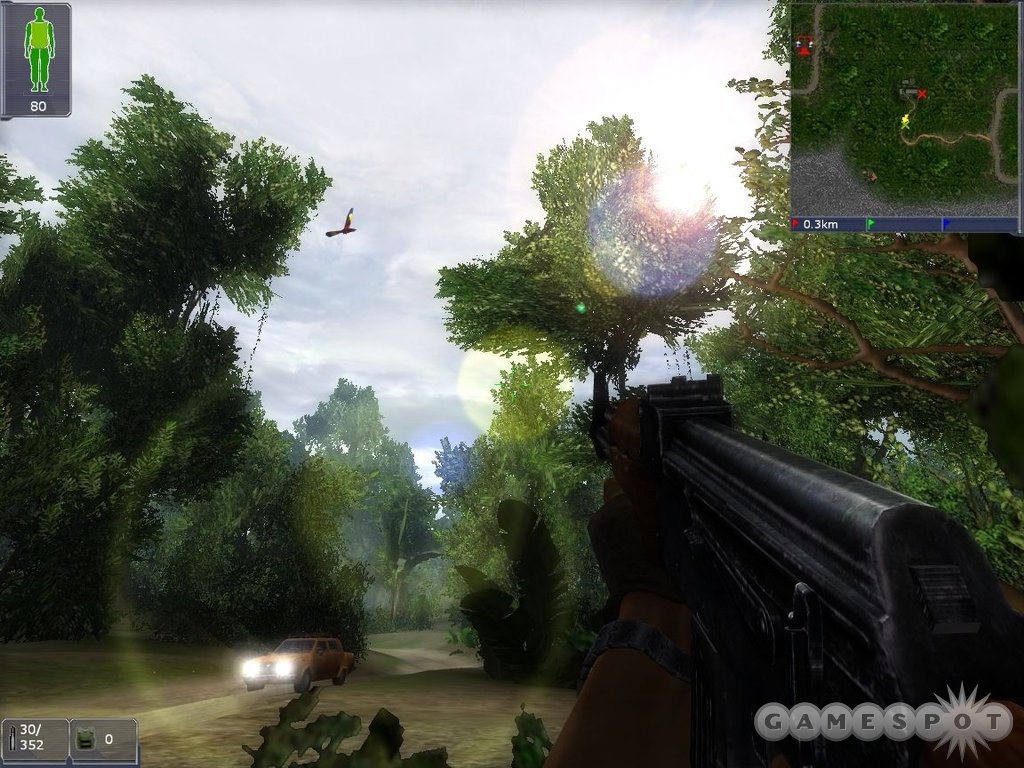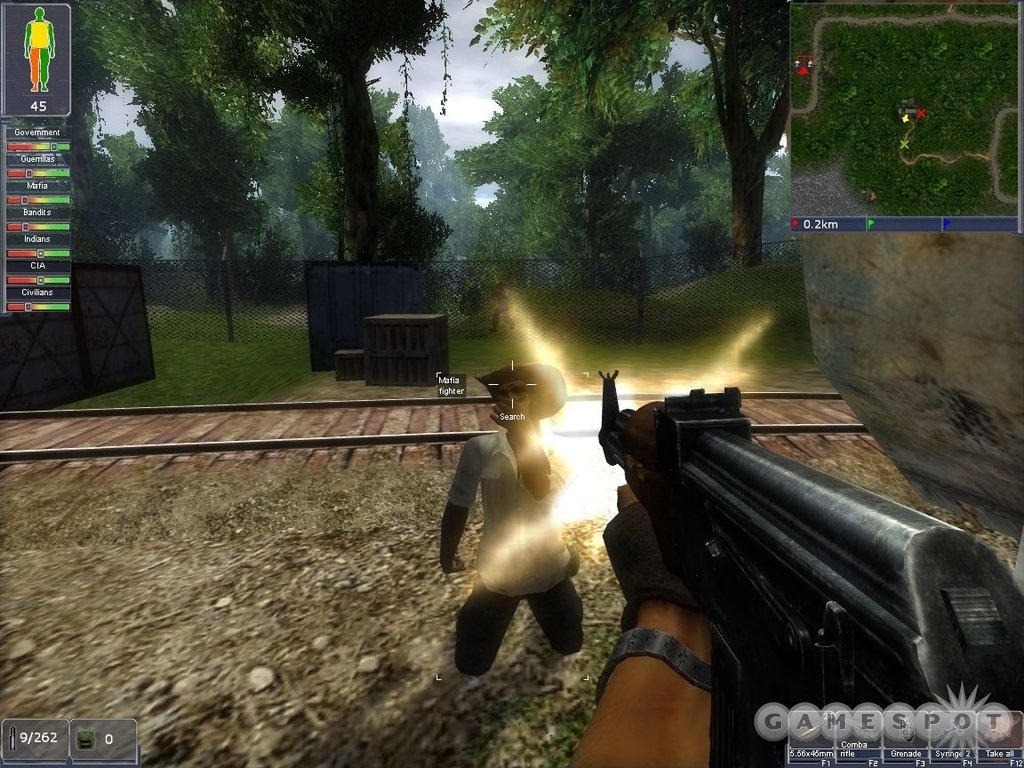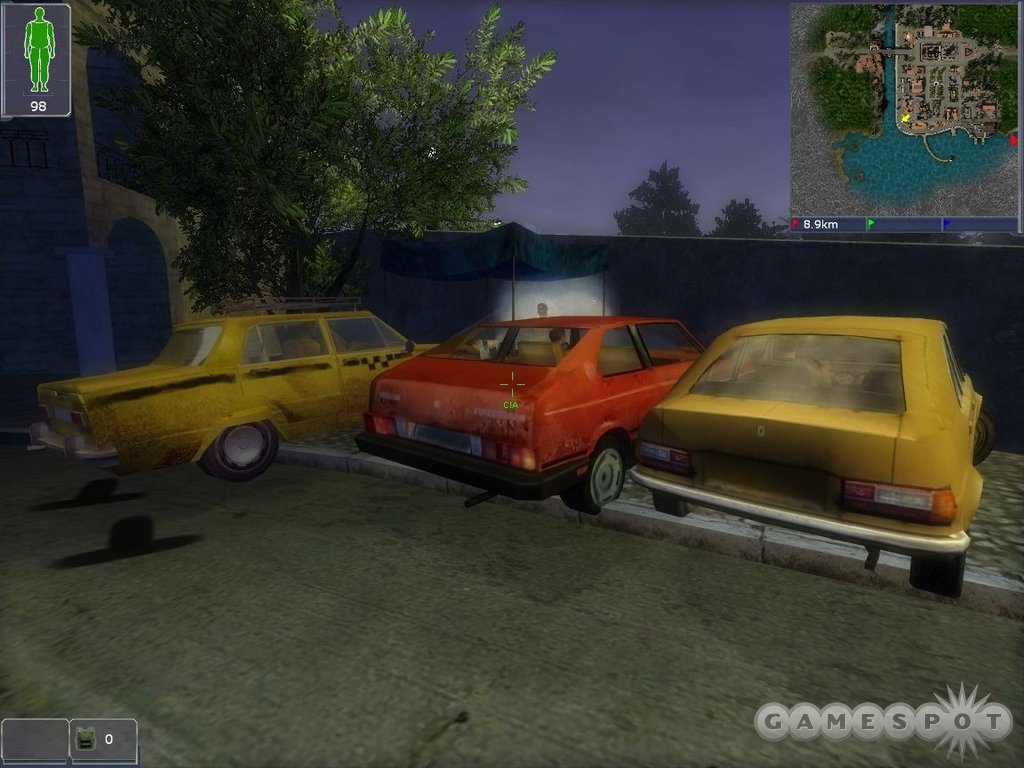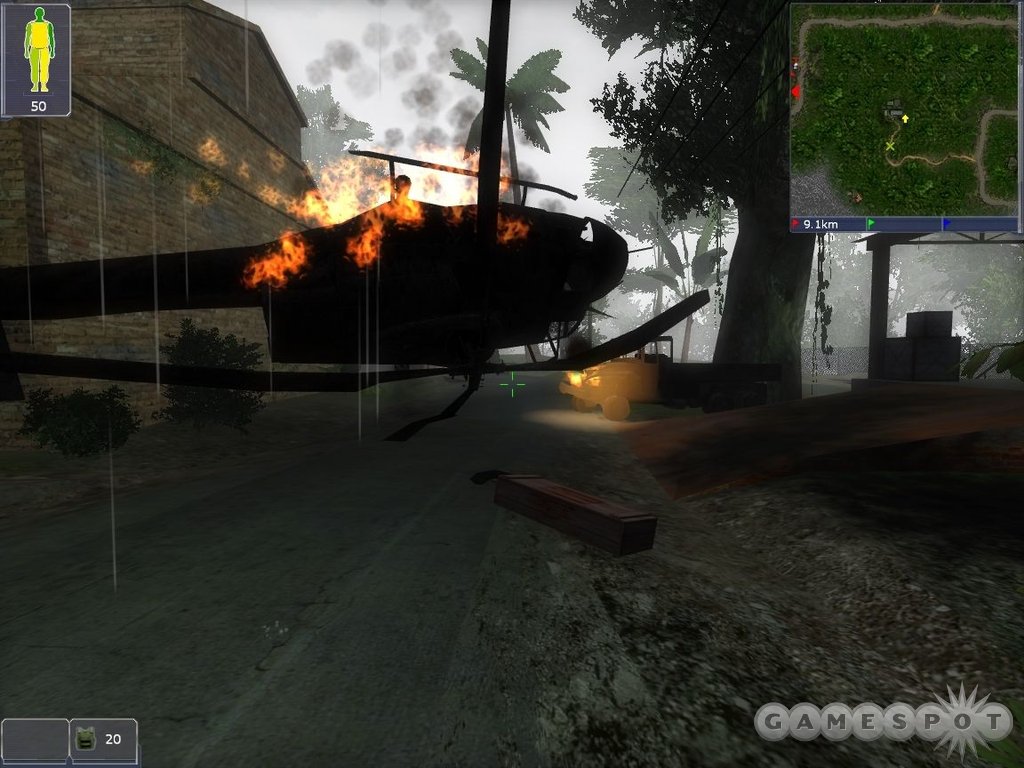Ambitious PC games rarely come without a host of problems. Boiling Point, a fusion of first-person shooter and role-playing game, is no exception to that rule, shipping with so many issues that it's unplayable out of the box. The Deep Shadows-developed game is crazy buggy, with frequent crashes, routine corruption of save files, vanishing non-player characters that makes it impossible to complete quests, and lots of other extreme weirdness, including the ability to destroy a police station with a single crossbow bolt. A recent patch eliminates the save bug and most of the quest and graphical oddities, but at present this game remains proudly unrefined.

So, caveat emptor. Keep in mind that this is for all intents and purposes a beta, even with the patch. You'll experience crashes, watch NPCs open and drink from invisible cans, encounter traffic pileups because the artificial intelligence drives worse than a fleet of little old ladies, and so forth. But with that said, Boiling Point is still an engaging play because there is nothing even remotely like it on the market. Deep Shadows has worked off the Grand Theft Auto template to fashion an open-ended hybrid shooter with more diverse missions and a more interesting setting than the genre has seen in years. While the plot is so derivative that it must power a dozen action movies--you play as Saul Meyers, a former French Legionnaire investigating the disappearance of his reporter daughter Lisa from a fictional South American nation called Realia--the design goes beyond ripping off Arnold Schwarzenegger's Commando and Crytek's Far Cry. Basically, this is Grand Theft Auto: San Andreas in the jungle, maybe with a dash of The Elder Scrolls III: Morrowind tossed in for good measure. Starting from the hub village of Puerto Somba, you take a roundabout path of looking for your girl that involves signing up for jobs doled out by the local bus station, government, mafia, guerrillas, CIA agents, bandits, and indigenous groups and trekking into the jungles in search of adventure and ways to make some cash.
Money is the main driving force here, because everybody has his hand out in this stereotypically corrupt banana republic. To get tips about Lisa's disappearance, you need to shell out 1,200 pesos here, 20,000 pesos there, and so on. Accepting these mercenary assignments typically comes at a nonmonetary cost, though, as faction members tend to remember the French commando who just killed a bunch of their buddies. Do thug work for the corrupt police force, and you'll make friends with the government at the expense of your relationship with the guerrillas and the bandits. Reverse your tactics and you'll sacrifice government goodwill to chum up to the communists and the crooks.
This means that you can't keep everybody happy. It also means that you probably won't be able to complete all of the available missions in a single run-through of the game, which enhances its replay value. That's a good thing, in part because there is no multiplayer option, but at the same time Boiling Point takes the factionalism too far. Accidentally shoot a civilian, for instance, and you become a walking target. Hunched-over grannies you were recently helping cross the street start tossing grenades, and average citizens suddenly become assassins. Every stroll down the street turns into a scene from The Wild Bunch. This constant harassment gets annoying in short order and dramatically ups the difficulty of missions, as you can find yourself flanked by Grandma Dynamite and her pistol-packing neighbors when attacking a guerrilla truck or a bandit drug lab.
Pitched battles aren't handled very well by the game engine either. Imprecise controls are exasperating at times, with everything feeling a little bit off. Movement and aiming are never quite fluid, although things get better as the game goes on and you improve both the quality of your weapons and Meyers' core stats, which govern his skills with automatic weapons, pistols, and the like. Enemies seem to be able to outrun bullets, so it's difficult to line them up as they zip between attacking in the open and taking cover. Also, even bare-chested thugs can take a good six or seven rounds before going down, so you can waste whole clips on single foes. Ammo is in cheap supply at the local arms dealer and, oddly enough, roadside fruit stands, but managing your shots is still vital, since it's easy to run out of bullets in the middle of firefights with these Speedy Gonzales characters. Equipment also degrades, so you have to keep guns repaired or risk firing duds in the middle of a melee.

Driving controls are another cause for complaint. Although including the ability to tool around in cars, choppers, tanks, and boats adds depth to Saul's South American adventure (though having to fill up with gas is a touch too much reality), Deep Shadows has done a lousy job with the mechanics. Driving a car, for example, is so touchy that it takes a good half hour of touring around town streets before you can maneuver around a simple corner without sideswiping a streetlight, let alone navigating the twisty dirt roads in the countryside. Better vehicles with improved handling are available as you progress through the game, although the controls are never more than tolerable. For what it's worth, the NPC drivers seem to have the same problem, judging by the number of times you come across them stuck on posts and walls.
There are other unwieldy design quirks. Managing inventory is far too finicky, thanks to a system that forces you to confirm every transfer of equipment. You even have to OK the individual number of bullets being moved. This makes it impossible to loot corpses for ammo in a firefight, as the extra steps usually occupy just enough time for you to take a bullet in the head. The map system features just a generic X to denote all mission locations, leaving you no idea whether the objective is up or down from your current position. Since a lot of indoor missions involve mazelike corridors and flights of stairs, this can lead to some confusion. And some set locations aren't shown on the map. While roadside stands and gas stations are represented by icons, key locales in town, such as the arms dealer's shop and the motel, are missing in action.

Some aspects of the plot are poorly constructed too. Arnold Vosloo of The Mummy and The Mummy Returns, uh, fame, plays Meyers flatly, reciting lines with little emotion. Some of the supporting cast are better, although a lot of lines in the game's many dialogue trees don't match their subtitles, and conversations often branch off in directions that don't make any sense. Just one of the dozens of examples is suddenly asking a man on the street if there are spies in town with absolutely no preamble about the CIA in Puerto Somba. These moments make it seem like dialogue choices were cut out of the game at the last minute to streamline conversations at the expense of lucidity. Just hearing dialogue is difficult, too, as conversations are buried beneath music and environmental effects.
OK, that's a lot of complaining. Boiling Point does have more than its fair share of flaws, but at the same time it is also uniquely appealing (and nearly impossible to stop playing) because of the gameworld's incredible openness. Being freed from the level-by-level design of the standard shooter is a treat all on its own. As the GTA series has proven, there's something extremely addictive about being released into a living and breathing world where you go out and explore to find your adventures.
Realia is absolutely huge, too, including more than 240 square miles of terrain. You need a top-notch machine with something like a Pentium IV 3.0 and a 9800- or 6800-class video card to appreciate everything, but if you are so equipped, the scenery is gorgeous. Lush jungle landscape and an overall run-down visual vibe (courtesy of such appropriate touches as rusted-out cars at the side of the road) convey the atmosphere of a South American country on the fringes of Third World status. There are no load times, either, so you can drive from one end of the map to the other without losing a second of immersion in the gameworld to a loading screen. Still, initial loads are very long, and there are enough pauses and hiccups that your suspension of disbelief isn't seamless.
Mission objectives are also incredibly varied. One moment you could be taking a photograph of the mayor meeting with an unsavory character, and the next you could be blitzing a military base to assassinate a rogue colonel, couriering a peace pipe for a local tribe, delivering mysterious packages for the CIA, or blowing up a drug shipment--the goals are all over the place, and you don't do anything twice. You're also free to devise innovative strategies that don't always involve leaving more bodies in your wake than Charles Manson. This diversity keeps the game feeling fresh during the entire 50 or so hours of play required to finish an initial run-through.

About the only real problem with missions is that they aren't set up with enough instructions or capped with cutscenes or events that bring your adventure to a satisfying conclusion. Usually, all you get for a job well done is a message saying "sub-mission accomplished." So, for example, when you plant drugs on a citizen targeted by the chief of police, you don't get to see this person actually arrested; your role comes to an end as soon as the drugs are dropped on the victim's nightstand.
Overall, Boiling Point is a great concept executed poorly. But if Deep Shadows puts some serious work into the upcoming patches (according to the company's Web site, version 2.0 is already in the works), this work-in-progress could evolve into one of the best shooters of 2005 and could become a real inspiration for shooter designers in the future.